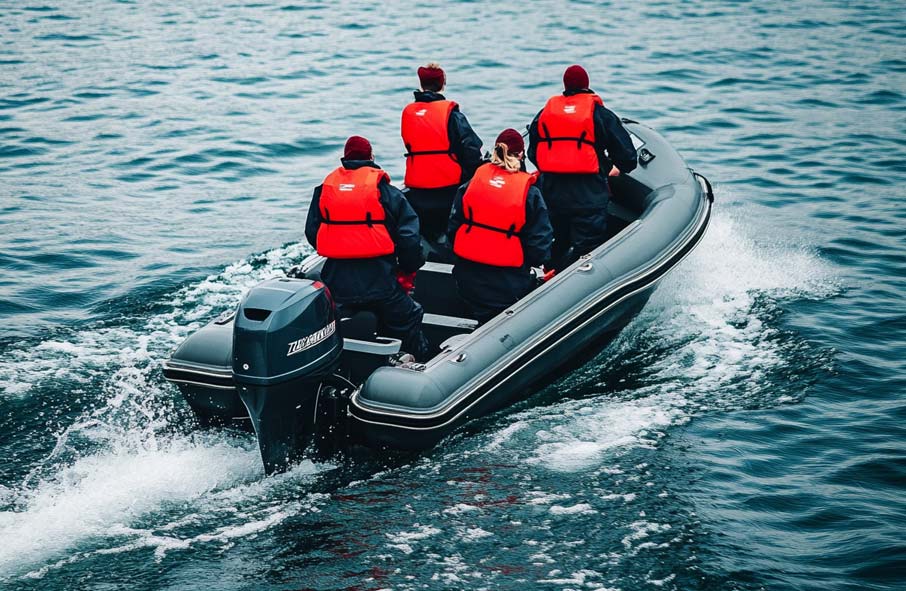How Much Does a Deckhand Make on a Superyacht?
- Authors
-
-

- Name
- Patrick Maflin
-

Working as a deckhand on a superyacht might sound like a dream job – endless blue horizons, glamorous destinations, and the chance to rub shoulders with the rich and famous.
But behind the Instagram-worthy snapshots is a physically demanding and highly disciplined role that serves as the entry point for most careers in yachting.
For those new to the industry or considering a maritime lifestyle, the big question is: how much does a deckhand make on a superyacht?
This guide offers a detailed and accurate look at the earning potential of deckhands, what the job entails, and how to break into the industry.
Whether you’re fresh out of school, switching careers, or just curious, this article will walk you through everything you need to know – no prior sailing experience required.
Chapters
- What is a Deckhand?
- What Does a Deckhand Do on a Yacht?
- How Much Does a Deckhand Make?
- How to Become a Deckhand
- Essential Attributes
- Nice to Have Attributes
- Conclusion
What is a Deckhand?

A deckhand is a junior crew member on a yacht, usually working under the supervision of a bosun or first officer.
They’re responsible for the exterior upkeep of the vessel and act as all-rounders when it comes to hands-on tasks on deck.
The deckhand role is considered entry-level in the superyacht world, but it’s far from basic.
From cleaning and maintenance to assisting with mooring operations and handling water toys, deckhands are key to ensuring everything runs smoothly above deck.
What Does a Deckhand Do on a Yacht?

The daily duties of a deckhand are wide-ranging and physically intensive.
Tasks vary depending on the size and type of yacht, but generally include:
- Cleaning and maintaining the yacht's exterior (known as "wash downs")
- olishing, varnishing and painting to keep the vessel in top condition
- Line handling during docking and anchoring
- Tender driving, ferrying guests to and from the shore
- Assisting with water toys, such as jet skis, paddleboards and diving gear
- Taking part in emergency drills and safety operations
- Providing discreet assistance to guests on deck when required
It’s a role that demands hard work, long hours, and a keen eye for detail.
That said, for those with the right attitude, it can also be a foot in the door to a rewarding and adventurous career.
How Much Does a Deckhand Make?
The salary of a deckhand varies based on several factors: experience, qualifications, the size of the yacht, and whether it’s privately owned or available for charter.
In general, most salaries fall within the following ranges:
Entry-Level Deckhand (0–1 years’ experience)
- £2,000 to £2,800 per month
- Equivalent to £24,000 to £33,600 per year
- Often includes free accommodation, meals, uniforms, flights and insurance, which significantly reduces living costs
Experienced Deckhand (1–3 years)
- £2,800 to £3,500 per month
- Equivalent to £33,600 to £42,000 per year
Senior Deckhand / Lead Deckhand
- £3,500 to £4,500+ per month
- With experience and additional responsibilities (such as tender driving or water sports leadership), senior deckhands can earn up to £54,000 annually
In addition to the base salary, charter tips can be a major boost.
Charter guests often tip generously at the end of their voyage, and this is usually split equally among the crew.
A busy season could see a deckhand earn several thousand pounds in additional income through tips alone.
Summary of Earnings Potential
| Experience Level | Typical Monthly Salary (£GBP) | Annual Salary Estimate (£GBP) | Notes |
|---|---|---|---|
| Entry-Level Deckhand | £2,000 – £2,800 | £24,000 – £33,600 | Usually with little or no experience, basic qualifications required. |
| Deckhand with 1+ Season Experience | £2,500 – £3,500 | £30,000 – £42,000 | Experience and strong references increase earning potential. |
| Experienced Deckhand with Additional Skills (e.g. Diving, Water Sports) | £3,000 – £4,000+ | £36,000 – £48,000+ | Valuable skills boost earnings; often found on larger or busier yachts. |
| Senior Deckhand / Lead Deckhand | £3,500 – £4,500+ | £42,000 – £54,000+ | Leadership responsibilities and several seasons' experience required. |
It’s important to remember that working on a yacht means living onboard, so most expenses such as accommodation, food, laundry, and travel, are all covered.
This means a large portion of your salary can be saved, especially if you’re frugal during your days off.
How to Become a Deckhand

Getting your first deckhand job on a superyacht takes more than just a desire to travel and work at sea.
While the industry is open to newcomers, it is also competitive and expects a certain level of commitment and preparation.
The process typically involves a combination of certification, attitude, and being in the right place at the right time.
Below is a step-by-step breakdown of what you’ll need to do to stand out and secure your first role.
Essential Attributes
ENG1 Medical Examination
Every crew member must pass an ENG1 Medical examination, issued by an MCA-approved doctor.
This confirms you are medically fit to work at sea.
It’s a simple check-up, but absolutely essential.
Without it, you cannot be employed aboard any commercial yacht.
STCW Basic Safety Training
The STCW (Standards of Training, Certification and Watchkeeping) is your first major step.
It’s a week-long course that covers personal survival techniques, fire fighting, first aid, and safety responsibilities at sea.
This qualification is mandatory for anyone working on commercial vessels, including superyachts.
Gain Skills & Experience
If you’ve worked in landscaping, painting, boatyards, or other hands-on roles, this experience is very relevant.
Even personal experience like sailing, lifeguarding, or operating water sports equipment can give you an edge.
Employers value practical skills, so make sure to highlight anything that proves you’re comfortable in physically demanding environments.
Positive Attitude and Work Ethic
Yacht captains and senior crew are always on the lookout for green crew who are humble, hardworking, and willing to learn.
You’ll be living and working in close quarters, so being respectful, tidy, and team-oriented is crucial.
A cheerful attitude and a strong work ethic can get you just as far as any certificate.
Update Your CV (Resumé)
Your CV should be tailored specifically to the yachting industry.
Highlight transferable skills, physical fitness, and any experience with customer service, hospitality, or maintenance work.
Include a recent, professional photo and keep the formatting clean and easy to read.
Register with Recruitment Agencies
There are a number of recruitment agencies that specialise in superyacht crew placements.
Some of the most reputable include YPI Crew, Bluewater, Meridian, and The Crew Network.
Register with several and keep your profile updated.
Go Dockwalking
Dockwalking involves heading to yacht marinas in crew hotspots, typically in locations such as Antibes, Palma de Mallorca, or Fort Lauderdale, and introducing yourself to boats that may be hiring.
It might sound old-fashioned, but it’s still one of the best ways to land your first job.
Dress smartly, bring printed CVs, and be polite but confident when speaking to crew on board.
Find Daywork
Before landing a full-time role, many green crew start with daywork - short-term tasks such as cleaning, polishing, or assisting with a yard period.
Dayworking is a great way to gain experience, make connections, and get references.
It also gives you a taste of the workload and expectations of life on board.
Apply for Jobs
Finally, keep a close eye on job boards, agency websites, and yachting groups on social media.
Apply professionally, follow up politely, and be patient.
The first job can take time, but perseverance pays off.
Nice to Have Attributes

While the following qualifications are not always required for your first deckhand job, they significantly improve your employability and may increase your salary potential.
If you can afford to invest in one or two extras, these are worth considering:
Efficient Deckhand Certification
Although not mandatory, the Efficient Deckhand (EDH) certificate is a recognised qualification that proves you have a solid understanding of seamanship.
It’s particularly useful if you're looking to progress in your career or eventually work towards officer roles.
However, it’s usually not the first qualification you’ll get.
Most entry-level deckhands start with more basic courses and return for the EDH after gaining some sea time.
RYA Day Skipper
This is a sailing qualification that shows you can take charge of a small yacht in familiar waters.
While it’s more relevant for career progression, it also shows a serious commitment to seamanship and is viewed positively by employers.
RYA Power Boat Level 2
A highly valuable certificate for deckhands, the RYA Powerboat Level 2 course teaches you how to drive tenders and small boats safely.
Since tender driving is a key part of the deckhand role, having this certification can help you stand out.
RYA VHF/SRC Radio Operators Certificate
This qualification covers the operation of marine VHF radios, essential for safe communication at sea.
It’s a short course and a good add-on to your core training.
IYT Tender Driving Licence
Offered by the International Yacht Training organisation, this licence focuses specifically on handling luxury tenders and high-speed chase boats, including guest transfers.
It’s a practical and desirable qualification for those seeking more responsibility on deck.
MCA Yacht Rating Certificate
This is another credential recognised under the UK Maritime and Coastguard Agency, often required for progression within deck departments on larger vessels.
It’s particularly useful if you’re looking at long-term career growth in the yachting industry.
Conclusion
Becoming a deckhand on a superyacht is not just about travel and sunshine, it is a serious job that requires preparation, dedication, and a strong work ethic.
But for those willing to put in the effort, the rewards can be significant: a generous salary, global adventures, and the opportunity to move up the ranks in one of the most exciting industries in the world.
So, how much does a deckhand make?
The answer depends on you, your qualifications, your attitude, and your determination to break into this competitive but rewarding world.
With the right approach, your first deckhand job could be the beginning of a lifelong career at sea.
In addition to a tax-free living situation onboard, British and American seafarers may also benefit from special tax exemptions depending on how much time they spend working outside their home country.
For UK-based deckhands, there is the Seafarers’ Earnings Deduction (SED) - a tax relief scheme that allows qualifying seafarers to claim 100% tax exemption on their foreign earnings.
To be eligible, you must spend at least 183 days outside the UK within a 365-day qualifying period, and work on a vessel that operates wholly or mainly outside UK territorial waters.
For American citizens working as deckhands, a similar benefit exists under the Foreign Earned Income Exclusion (FEIE).
This allows qualifying individuals to exclude a portion of their foreign income (up to a specified limit) from US federal income tax, provided they meet either the Physical Presence Test (usually 330 days abroad in a 12-month period) or the Bona Fide Residence Test.
These tax rules can be complex and require proper documentation of your days at sea, earnings, and travel schedules.
That’s why it’s strongly recommended to speak with a specialist seafarers’ accountant.
They understand the ins and outs of maritime taxation and can help you legally reduce or eliminate your tax bill, ensuring you keep every pound and penny you’ve worked hard for.
Whether you're just starting out or climbing the career ladder, smart financial planning is just as important as good seamanship.
Pairing your hard-earned experience at sea with expert advice onshore can help set you up for long-term success - both professionally and financially.
Disclaimer: Any advice in this publication is not intended or written by Marine Accounts to be used by a client or entity for the purpose of (i) avoiding penalties that may be imposed on any taxpayer or (ii) promoting, marketing or recommending to another party matters herein.





